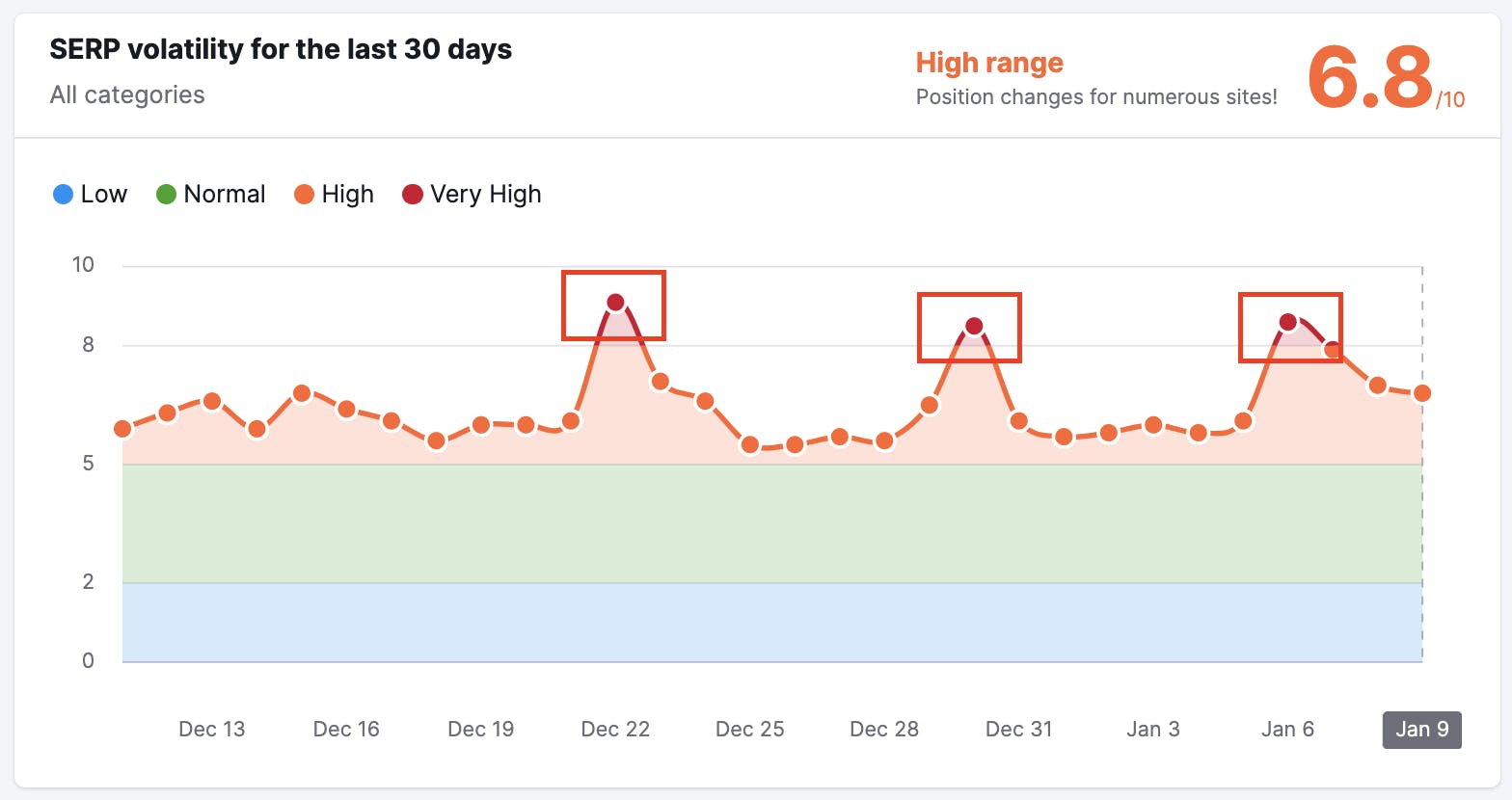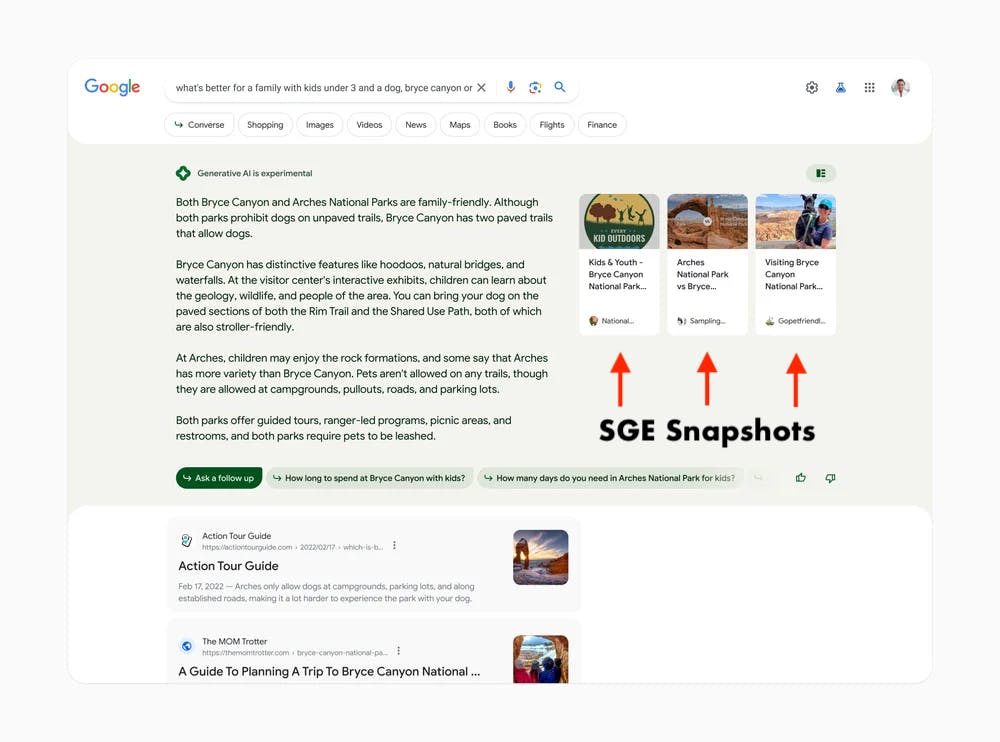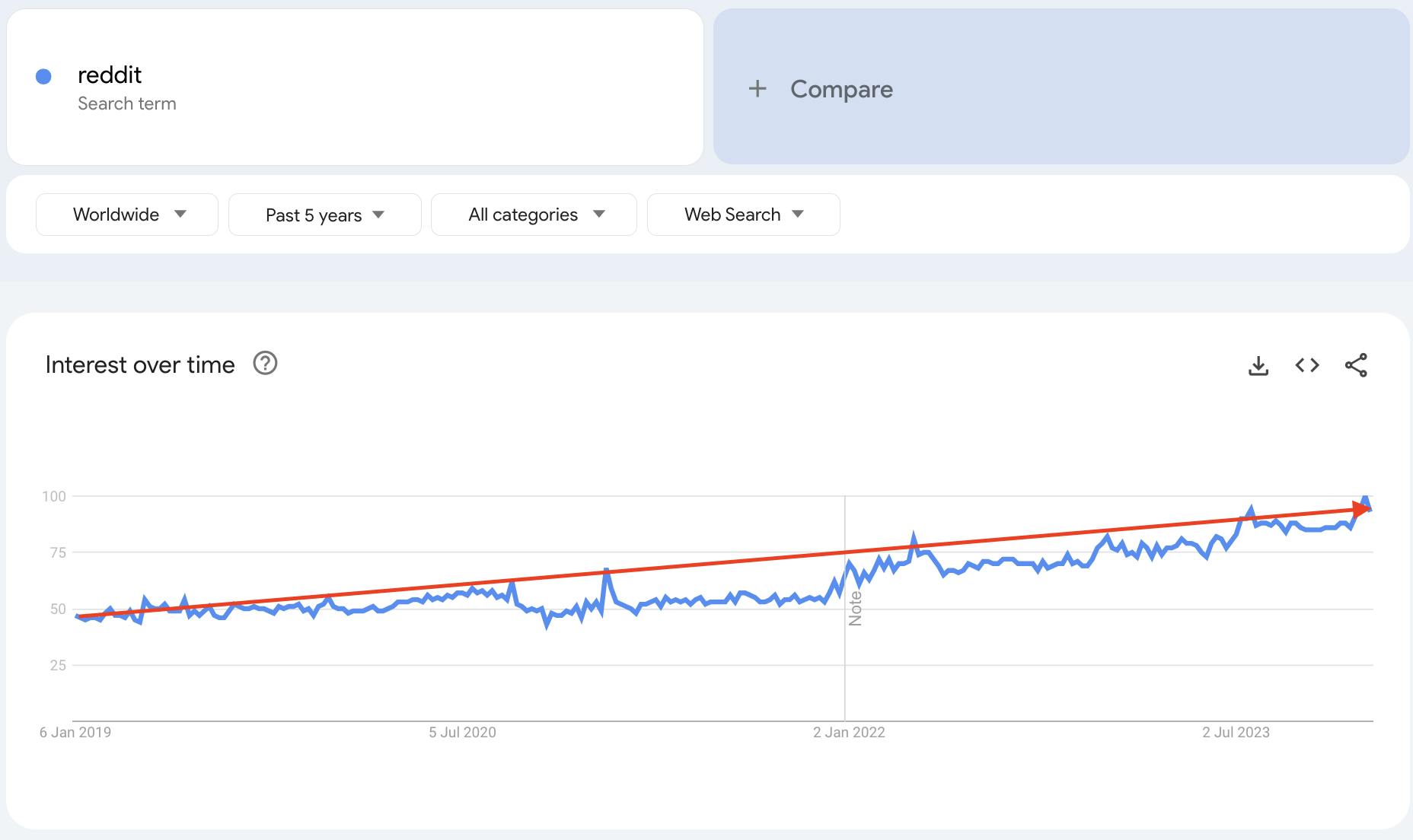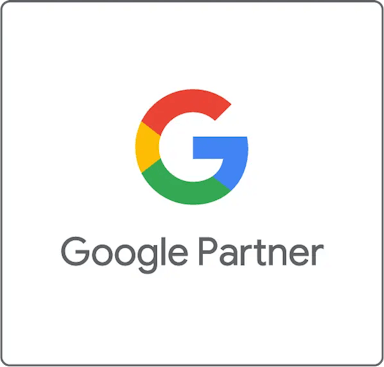The Future of SEO in 2024

What does 2024 hold for an ecommerce business and their SEO strategy? Probably more AI and maybe more volatility. We’ll dig into the trends we saw emerge last year so we can be prepared for a turbulent year ahead.
The biggest story of 2023 by far was the mainstream utilisation of generative AI, like Chat-GPT, and how it merged with our understanding of the search engine. Bing Chat and Google’s Search Generative Experience were at the centre of that conversation.
Meanwhile, search engine results page (SERP) volatility seemed to be at an all-time-high. Kevin Inding writes that “2023 has been one of the most volatile years for SEO so far”. But was it?
2024 won't be that bad, surely?
AI-generated content in ecommerce SEO
AI-generated content can be a powerful tool for e-commerce SEO. Search for “use chat gpt for product descriptions” and you’ll see over five million results. If you’re not doing so already, consider including generative AI in your content creation operations.
Tools like Chat-GPT can be automated and used to create product descriptions, meta data and even blog content at scale. But, we think relying on AI-generated content alone and unedited is a short-sighted strategy.
Let's take product descriptions, an essential element of any ecommerce website. If your options are (1) having no product description at all, or (2) using an AI-written product description, then option 2 is clearly better. But if you use (3) expert-edited and AI-enhanced product descriptions it’s better still.
Remember that even minimal human oversight is essential to ensure content quality and relevance. Using an expert-level content editor should make the combined approach of AI and human content creation more effective for long-term success.
SERP Volatility in 2024
Search Engine Journal claims that “2023 has been one of the most volatile years for SEO so far”. But, has it?
It’s hard to get an accurate measure of ‘volatility’ but there’s one key figure in SEO that probably knows the most about the ups and downs of the SERPs, Barry Schwartz from Search Engine Roundtable.
one of the most volatile years in SEO so far
”Most SEOs get Barry Schwartz’s search forum recaps delivered to their inbox on a regular basis. If you do (and you should) then it won’t be long until you see the word ‘volatility’ mentioned.
Barry wrote 1.75 articles per week on Google’s SERP volatility in 2023 (~91 articles), which makes it sound like there was a lot going on all year. But, there was just about the same amount going on the year before in 2022 as well (~93 articles).
Likewise, Google’s Search Status Dashboard reports 9 official documented and confirmed updates (and 1 ranking issue) in 2023. Which is about the same as 2022, and 2021. And before that was 2020, and we remember how turbulent that was…
It’s important to remember that ranking updates and turbulence will affect websites totally differently depending on their niche topic.
SERPs have been volatile for at least the past two-to-four years and that doesn’t show any sign of changing as we start 2024. It seems inflammatory to claim that 2023 was the most volatile year for SEO so far, but there was a lot of change. So, if volatile is just how the SERPs are then “it's not really volatility”.
Either way, 2024 seems set to continue the trend. Semrush Sensor has shown three high volatility peaks in the SERPs over the past month (see image below).

Image source: Semrush Sensor
If the only constant is constant change then SEO can quickly “get confusing and frustrating no matter the size of your company”. But where does that leave the SEO manager in any ecommerce business?
Motoko Hunt has some pretty good advice in Search Engine Journal’s SEO Trends 2024 ebook. Hunt says, “What you don’t want to do is to overreact [...] read what the search engines and trusted industry news sources say, and don’t focus on every comment and rumour on social media”.
That’s pretty sound advice in our opinion. So, what can you do in 2024?
Our top ecommerce SEO tips for 2024
We think there are four key things that every ecommerce business should focus on for 2024 in order to remain stable and ready for another volatile year in SEO:
- Understand how SEO is changing on a regular basis
- Utilise new technologies
- Then add human expertise
- Remain focused and consider all channels
Stay up to date with SEO in 2024
It’s important to stay abreast of how SERPs and ranking algorithms are changing, and not just on Google, but for a non-SEO specialist it’s often difficult to understand how these changes might affect your business.
As an ecommerce manager, we’d recommend a trustworthy SEO agency or in-house expert that can help provide context and narrative to SEO news.
In general, we’re likely to see differences emerge in user behaviour from search engine results pages. As Aleyda Solis says, users might shift from “clicking on reviews [and] articles” and “go directly to product description pages through SGE snapshots.”

Image source: https://blog.google/products/search/generative-ai-search/
The good thing is that users still need answers, and they still need/want physical products, and for ecommerce businesses that’s an important distinction to make.
Utilise new technologies for ecommerce content creation
Generative AI will mean there’s almost no excuse for not having a basic level of quality, readable content in any language on every page of your ecommerce website.
New technologies should make it easy for non-technical people to generate accurate content but remember, if AI-generated content is readily available then everyone else is using it too, which leads us on to our next tip…
Add human experience and expertise to your content
AI generated content will become commonplace across almost all industries (if it hasn’t already). This content standard will become the new benchmark so it’ll be important to add genuine value in 2024.
Patrick Stox from Ahrefs offers some great advice, “Think of content the same way [you] would a product and take an iterative approach”. This might include:
- Add a new specific section
- Expand on a section with more details
- Add new key points
- Summarise a point in a better way
- Tell a personal story
- Add additional insights from your own expertise
- Add unique photos
- Include breakdowns by different categories
And remember, “If you don’t have that knowledge, find and interview someone who does. Ask them to review the content and check for any mistakes or add their insights and stories”.
In the past, we’ve seen the growth of zero click searches. These queries are ones that can be answered directly in the SERP, without any need to click a blue link. Obviously, this is better for users but businesses see a rapid decline in click-through rates (CTRs) as a result.
If Bing Chat and Google’s Search Generative Experience become more widely adopted then we could see more and more queries become zero click searches. However, we’ll all have to “accept that the user never wanted a website for some searches – they just wanted an answer”. (Ryan Jones, Razorfish).
If you’re currently focusing an SEO strategy on answering simple queries (no matter how niche they might be), it’s perhaps time to start focusing on broader topics.
Remain focused and consider all channels in 2024
SEO has never been a ‘reactive’ digital marketing channel. That’s just because it takes time for search engines to crawl and understand our websites. This means that organic search has typically focused on creating evergreen content that adds to the authority of your website.
One Redditor, digitalsleights mentions that it used to be “possible to take a new site and rank it within weeks and sometimes even days [but now] authority sites are dominating and taking traffic from the little guys. Source: https://www.reddit.com/r/SEO/comments/18djmw4/what_is_going_to_happen_predictions_for_2024/
Whether or not the first part of that is true, we can’t ignore the ever-looming presence of ecommerce giants like Amazon. We repeatedly see Amazon.co.uk holding a very large slice of SERP visibility.
The charts below show two of our clients, from very different niches, both competing with Amazon. When large ecommerce stores dominate product searches will users ever purchase from smaller stores?
Perhaps not, but there is one possible solution. If you can’t beat them, join them. Our Amazon ecommerce selling services can help you get up and running on the world’s largest ecommerce platform.

Image source: Semrush Position Tracking Tool
There’s a similar story for sites that rely on helpful informational content. It’s likely that we’ll see websites that collate user-generated content (UGC) such as Quora and Reddit being favoured over smaller blogs.

Source: Google Trends
Google Trends shows that the number of searches for ‘reddit’ has doubled over the past 5 years and doesn't look like it's slowing down anytime soon.
So, with all this changing behaviour, we have to face the fact that our rankings might go down in 2024 - but what should we do about it?
If you see keyword rankings being lost, the first thing to do is understand what could be causing it. Any SEO worth their salt should be able to say if your position losses are due to algorithm updates, or other websites outperforming you.
But that knowledge isn’t very much help on its own. So what can ecommerce stores do in 2024? The first thing you don’t want to do is panic and get reactive. Stay calm and…
Understand your customer and diversify your digital marketing
As consumer behaviours and technologies continue to shift, it's essential to understand how and why your customers shop from you. Firstly, research your customers, then create a holistic marketing strategy that provides the help, answers, and products they’re looking for.
You can learn more about your customers by:
- Leveraging analytics tools like Google Analytics to track customer behaviour on your website. Do the same with your social media following.
- Conducting user testing sessions to observe how customers interact with your website or products.
- Analysing the performance of email campaigns to understand what resonates with your audience.
- Looking for answers to the questions that your customers have. This will help you to understand the places that people are looking for answers.
Collate this research and make sure your team is clear on what it means. Then get creative. The key to getting your marketing strategy right is to not limit your output to one channel.
This can be difficult, so having the right team around you is essential. If you don’t have the expertise in-house then an ecommerce digital marketing agency can come in handy.
Turn content from blogs into assets for email campaigns, LinkedIn, Instagram, Facebook, whatever works for your audience. Collate content into learning hubs that are easily accessed by your audience. Invest in customer service so your users can find answers when they need them. Don’t just share links, create actually useful content for the platforms your business prioritises and your website.
Finally, consider new platforms. Contributing to UGC platforms like Quora and Reddit as a topic expert can help to distinguish your business as a leader.
A story about diversifying your digital marketing
I was looking for in-depth and truthful information about CBD supplements but SERPs were flooded with blogs filled with affiliate links and ecommerce stores selling thousands of products.
I searched Reddit and found an incredibly detailed write up of the varieties and types of CBD available and it sounded like the thing I was looking for. I actually got in contact with the business and ended up having a 45 minute phone consultation with their owner.
He told me about how and why the company started and gave me some product recommendations whilst explaining the reason for certain price points, and offering some benefits of each option.
Feeling no obligation to buy anything I left that interaction and went on to purchase a few things. Delivery was rapid and post-purchase email communication was spot on. It's been about three years since I made my first purchase and I’m still a repeat customer. I’ve also recommended the brand to loads of people.
My experience didn’t just result in a sale for this company but also brand advocacy. Remember, it worked because every touchpoint worked properly and the level of service, and quality of information, I received was exemplary. Could you replicate something like this for your business?
Over to you
The rapidly changing SEO landscape in 2024, characterised by AI advancements and ongoing SERP volatility, presents both challenges and opportunities for ecommerce businesses. Understanding these shifts, and wider trends in digital marketing, and adapting your strategy accordingly is crucial.
As an ecommerce manager, your focus should be on comprehensively understanding SEO changes, leveraging new technologies, and combining AI-generated content with human expertise. It's equally important to remain focused and diversify your digital marketing efforts across various channels.
If navigating these changes seems daunting, remember, you're not alone. Our digital marketing team specialises in helping businesses like yours stay ahead of the curve. Digital Six can help you adapt to these changes so you thrive in the dynamic world of SEO.
Reach out to us today to tailor a digital marketing strategy that's as dynamic as the SEO landscape of 2024. Get in touch today, we're just an email away.
Some useful resources
Our guide to Progressive Web Apps for ecommerce
Digital Six's guide to Writing a Good eCommerce Brief [with free RFP template]
Headless ecommerce case study for Edinburgh Gin's website
A look into how digital marketing is changing in 2024
Our related ecommerce services
Learn more about our individual ecommerce services on these pages:



